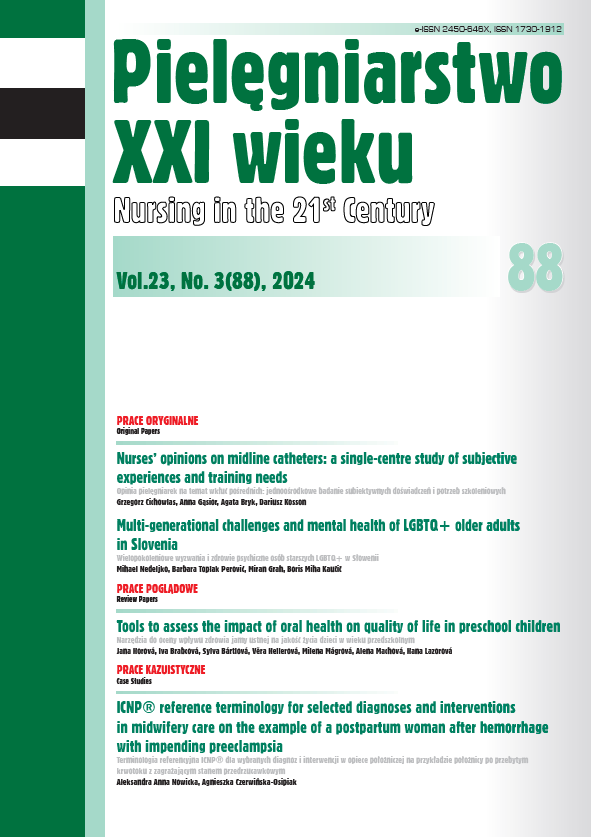Wielopokoleniowe wyzwania i zdrowie psychiczne osób starszych LGBTQ+ w Słowenii
DOI:
https://doi.org/10.2478/pielxxiw-2024-0033Słowa kluczowe:
odporność, dyskryminacja, stres mniejszościowy, zdrowie psychiczne, osoby starsze LGBTQ+Abstrakt
WIELOPOKOLENIOWE WYZWANIA I ZDROWIE PSYCHICZNE OSÓB STARSZYCH LGBTQ+ W SŁOWENII
Cel pracy. Celem badania było ustalenie, czy istnieją różnice w zdrowiu psychicznym między młodszymi i starszymi pokoleniami starszych osób LGBTQ +.
Materiał i metody. Zastosowano podejście ilościowe. Kwestionariusz został wypełniony przez 318 starszych osób LGBTQ+ (50+) ze Słowenii, które spełniły kryteria włączenia i zostały wybrane przy użyciu nielosowego doboru próby. Do analizy statystycznej wykorzystano eksploracyjną analizę czynnikową (EFA) oraz test U Manna-Whitneya w celu porównania dwóch niezależnych grup.
Wyniki. W badaniu otrzymaliśmy 318 w pełni wypełnionych kwestionariuszy. Analiza EFA wyodrębniła jeden czynnik. Wyniki pokazują statystycznie istotne różnice w zdrowiu psychicznym między młodszymi i starszymi pokoleniami starszych osób LGBTQ+ w przypadku dwóch pozycji: często doświadczam stresu i stałem się bardziej odporny na skutek stawiania czoła wielu nierównościom społecznym. Młodsze pokolenie osób starszych LGBTQ+ częściej deklaruje doświadczanie stresu, ale jednocześnie wyraża poczucie odporności psychicznej.
Wnioski. Pomimo stresu, osoby starsze LGBTQ+ - zwłaszcza młodsze pokolenie - rozwinęły odporność pozwalającą sprostać wyzwaniom i poprawić zdrowie psychiczne. Uwzględnienie specyficznych potrzeb osób starszych LGBTQ+ i poprawa ich zdrowia psychicznego wymaga wyeliminowania uprzedzeń i dyskryminacji oraz uwzględnienia złożoności tożsamości i doświadczeń tych osób.
Bibliografia
1. United Nations Department of Economic and Social Affairs PD. World Population Ageing 2020 Highlights: Living arrangements of older persons 2020.
2. Emlet CA. Social, economic, and health disparities among LGBT older adults. Generations. 2016;40(2):16-22.
3. Bloemen EM, Rosen T, LoFaso VM, et al. Lesbian, Gay, Bisexual, and Transgender Older Adults' Experiences With Elder Abuse and Neglect. JAGS. 2019;67(11):2338-2345.
4. Lagana L, Balian OA, Nakhla MZ, et al. A preliminary model of health regarding sexual and ethnic minority older adults. CHS. 2021;23(3):333-348.
5. Goldsen KF. Shifting social context in the lives of LGBTQ older adults. Public Policy & Aging Report. 2018;28(1):24-28.
6. Nourafshan AM. The new employment discrimination: Intra-LGBT intersectional invisibility and the marginalization of minority subclasses in antidiscrimination law. Duke J. Gender L & Pol'y. 2016;24:107.
7. Yarns BC, Abrams JM, Meeks TW, et al. The mental health of older LGBT adults. Curr. Psychiatry Rep. 2016;18:1-11.
8. Perone AK, Ingersoll-Dayton B, Watkins-Dukhie K. Social isolation loneliness among LGBT older adults: Lessons learned from a pilot friendly caller program. Clin. Soc. Work J. 2020;48(1):126-139.
9. MongeLli F, Perrone D, BaLducci J, et al. Minority stress and mental health among LGBT populations: An update on the evidence. Minerva Psichiatr. 2019;60(1):27-50.
10. McCann E, Sharek D, Higgins A, et al. Lesbian, gay, bisexual and transgender older people in Ireland: Mental health issues. Aging Ment. Health. 2013;17(3):358-65.
11. Fredriksen-Goldsen KI, Emlet CA, Kim H-J, et al. The physical and mental health of lesbian, gay male, and bisexual (LGB) older adults: The role of key health indicators and risk and protective factors. The Gerontologist. 2013;53(4):664-675.
12. Jurček A, Urek M, Sobočan AM. Življenja LGBTQ+ starejših od 50 let v času epidemije covida-19. Soc Delo J. 2022;61(1).
13. Nedeljko M, Toplak-Perović B, Grah M, et al. Exploring Disparities in Life Satisfaction among LGBTQ+ Older Adults in different Living Environments: The Case of Slovenia. Open Access Maced. J. Med. Sci. 2024.
14. Jerala N, Petek D. Enhancing LGBT + primary healthcare in Slovenia: A national qualitative study of experiences and expectations of LGBT + people and family doctors. EJGP. 2024;30(1):2373121.
15. Peel E, Rivers I, Tyler A, et al. Exploring LGBT resilience and moving beyond a deficit-model: findings from a qualitative study in England. Psychol. Sex.. 2023;14(1):114-126.
16. Pachankis JE, Sullivan TJ, Feinstein BA, et al. Young adult gay and bisexual men’s stigma experiences and mental health: An 8-year longitudinal study. Dev. Psychol.. 2018;54(7):1381.
17. Reker GT. Successful Aging Scale (SAS). Trent University. 2009:1-14
18. Brečko BN. Istospolno usmerjeni: metodologija raziskovanja skritih populacij. Družboslovne razprave. 2005;21(49-50):107-118.
19. Tourangeau R, Smith TW. Asking sensitive questions: The impact of data collection mode, question format, and question context. Public opinion quarterly. 1996;60(2):275-304.
20. Kaiser HF. An index of factorial simplicity. Psychometrika. 1974;39(1):31-6.
21. Costello AB, Osborne J. Best practices in exploratory factor analysis: Four recommendations for getting the most from your analysis. Practical assessment, research, and evaluation. 2019;10(1):7.
22. Hair JR, Anderson RE, Tatham RL, et al. Multivariate Data Analysis. Upper Saddle River, NJ: Prentise-Hall. Inc; 1998.
23. Milenović Ž. Application of Mann-Whitney U test in research of professional training of primary school teachers. Metodički obzori: časopis za odgojno-obrazovnu teoriju i praksu. 2011;6(11):73-79.
24. Wen J, Shi Y-k, Li Y-p, et al. Quality of life, physical diseases, and psychological impairment among survivors 3 years after Wenchuan earthquake: a population based survey. PloS one. 2012;7(8):e43081-e.
25. Frost DM, Lehavot K, Meyer IH. Minority stress and physical health among sexual minority individuals. J. Behav. Med. 2015;38:1-8.
26. Gonzales G, Henning-Smith C. Health disparities by sexual orientation: Results and implications from the Behavioral Risk Factor Surveillance System. J. Community Health. 2017;42:1163-72.
27. Singh AA. Understanding trauma and supporting resilience with LGBT people of color. Trauma, resilience, and health promotion in LGBT patients: What every healthcare provider should know. Springer. 2017:113-9.
Pobrania
Opublikowane
Numer
Dział
Licencja
Prawa autorskie (c) 2024 Autorzy

Utwór dostępny jest na licencji Creative Commons Uznanie autorstwa 4.0 Międzynarodowe.




